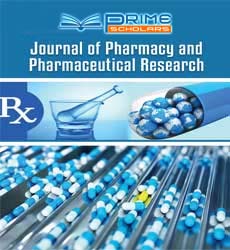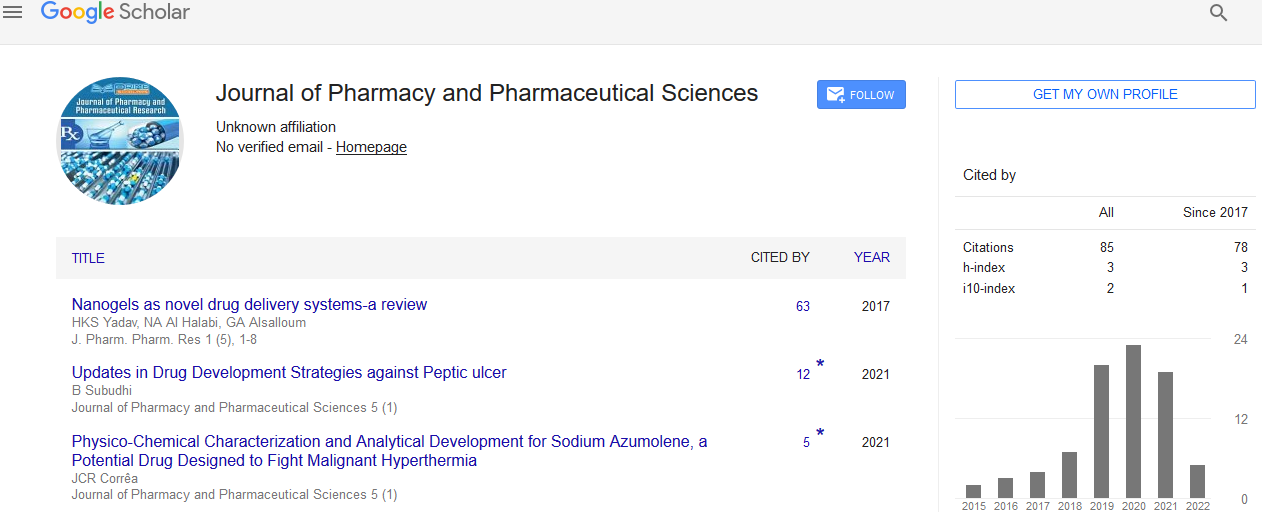James D Adams*
Associate Professor, USC School of Pharmacy, Los Angeles, CA, USA
*Corresponding Author:
James D Adams
Associate Professor, USC School of Pharmacy
Los Angeles, CA, USA
Tel: +267 464 2554
E-mail: jadams@usc.edu
Received date: December 05, 2017; Accepted date: January 04, 2018; Published date: January 14, 2018
Citation: Adams JD (2018) Commentary on Medicinal Plants of the West. J Pharm Pharmaceut Res Vol. 2 No. 1:8.
Copyright: © 2018 Adams JD. This is an open-access article distributed under the terms of the Creative Commons Attribution License, which permits unrestricted use, distribution, and reproduction in any medium, provided the original author and source are credited.
Short Commentary
Medicinal plants of the west – cultural and scientific basis for their use third edition revised was released in 2016 by Abedus Press [1]. It is a self-published book that has been very successful. The book has 271 pages with 116 color photographs, 309 references and an index. The book has been used as a text book for the past 10 years by the Pharmacy Students at USC who have the option of taking a class in Chumash Healing. It is also a reference for the Medical Students at USC who have the option to study complementary and alternative therapies.
Medicinal plants of the west – cultural and scientific basis for their use third edition revised was released in 2016 by Abedus Press [1]. It is a self-published book that has been very successful. The book has 271 pages with 116 color photographs, 309 references and an index. The book has been used as a text book for the past 10 years by the Pharmacy Students at USC who have the option of taking a class in Chumash Healing. It is also a reference for the Medical Students at USC who have the option to study complementary and alternative therapies.
The Chumash people traditionally inhabited coastal areas of California from what is now Malibu to San Luis Obispo. Beginning in 1772, the Spanish came to Chumash territory and committed a genocide against the Chumash people which involved murdering the men, kidnapping the children, forcing them to live in the Missions and infecting the teenage girls with gonorrhea, which can cause infertility [2]. Because of gonorrhea, Mission Indian birth rates were very low. When California became a state in 1850, another genocide was committed against the Chumash people by the US Army and California State Militias which involved hunting and killing entire villages [3]. During this period, Indian children were used as slaves by US citizens in California. In October 1855, the US Army closed the Chumash Medical School in the Tejon Pass area [4]. They did this to stop the Chumash Religion and Chumash Healing. The Chumash Religion continues to be illegal in California today. Fortunately, Chumash people have survived and continue to teach Chumash Healing.
American society is plagued with chronic diseases that have no drug cures – heart disease including hypertension and hyperlipidemia, diabetes type II and arthritis including osteoporosis. The incidence of these diseases has increased yearly since the 1980s. About 50% of American adults have heart disease. About 9% of American adults have type 2 diabetes. These diseases are caused by obesity. Visceral fat releases inflammatory proteins such as visfatin, leptin, resistin, TNFα and IL6 and toxic lipids such as ceramide and endocannabinoids. These inflammatory compounds cause atherosclerosis, high blood pressure, insulin resistance, cartilage and bone degradation [5]. These chronic diseases are treated with drugs that do not cure and must be taken indefinitely. Adverse reactions from these drugs are of major concern to patients. Pain from arthritis and other chronic conditions is treated with opioids that kill 50,000 people every year from respiratory depression and seizures. NSAIDs are also used for pain and kill at least 54,500 people every year from ulcers, heart attacks and strokes [6].
One of the great fallacies of modern medicine is that pain should be treated with medicines that are taken internally, such as by mouth or injection. There is a misperception that pain comes from the brain, brain stem and other internal sources. This is wrong. Pain is sensed in the skin by transient receptor potential cation channels [7,8]. These channels are the most abundant pain receptors in the body and are most plentiful in the skin. Even the pain from broken bones, kidney stones and cancer is sensed in the skin. The misperception that pain must be treated internally is currently killing over 100,000 patients every year.
Another great fallacy of modern medicine is that drugs cure diseases. The truth is that the body cures itself [9]. Drugs can help the body heal itself. Modern medicine may have forgotten that the most powerful medicine is the human body and its ability to heal itself. The most powerful antibiotics and anticancer drugs cannot heal a body that is too sick and cannot heal itself. Double blind, placebo controlled, randomized clinical trials frequently fail because the body heals itself [10].
How can traditional Healing help? Disease prevention is the first priority. People are taught how to live in balance. When a person lives in balance, the body heals itself [11]. Plant medicines can help when necessary. Human beings have evolved using plant medicines for over 200,000 years. Natural selection has allowed the survival of those people who respond to plant medicines. We can benefit from plant medicines today. There is a current attitude in the medical profession that plant medicines are dangerous or do nothing. The truth is that plant medicines are no more dangerous than drugs. Plant medicines can be more effective than drugs.
The book discusses 116 plants found in the western United States. For each plant a photograph, identification, characteristics, distribution, primary uses, secondary uses, active compounds and recommendations for use are given with references. For several plants the exact recipes for making the plant medicines are given. One distinguishing feature of traditional Chumash Healing is that most plant teas are used as very mild preparations. This is similar to Chinese teas that are usually very mild. This contrasts with European teas that can be very strong and bitter.
Another characteristic of traditional Healing is that pain is treated in the skin, where it is felt. The safest and most effective treatment for pain is in the skin. Several plants, including California sagebrush (Artemisia californica) contain monoterpenoids and sesquiterpenes that penetrate into the skin [12-14]. Monoterpenoids inhibit transient receptor potential cation channels and stop pain. It is best to use a mixture of monoterpenoids such as from black sage (Salvia mellifera), rather than single purified monoterpenoids, to treat pain. This is because there are at least 28 distinct transient receptor potential cation channels the respond differently to monoterpenoids. These 28 types of transient receptor potential cation channels occur in non-overlapping populations of skin sensory afferent neurons. Sesquiterpenoids penetrate into the skin and inhibit cyclooxygenase 2 that is induced in the skin during painful conditions. Orally administered drugs do not penetrate into the skin adequately to inhibit skin cyclooxygenase 2. The use of plant medicines in pain patients could save over 100,000 lives yearly. Unfortunately, the FDA did not approve an IND application that would have allowed a clinical trial of the sagebrush medicine.
Another characteristic of traditional Healing is that lung diseases are treated by inhalation of the vapor from boiling plant medicines, such as yerba santa (Eriodictyon crassifolia). Teas are also drunk in combination with inhalation for severe pulmonary diseases such as tuberculosis. Modern medicine has forgotten that prior to 1960, the drugs of choice for tuberculosis were plant medicines. Over 80 years of clinical experience, from 1880 to 1960, showed that these plant medicines were useful against tuberculosis. These plant medicines are also useful against pneumonia. The most deadly communicable disease today is tuberculosis, since it is becoming resistant to all of the purified drugs that are available. Tuberculosis kills more than 1.5 million people yearly. Modern medicine will eventually reconsider plant medicines in the treatment of tuberculosis, such as Eriodictyon crassifolium and Grindelia camporum [15,16].
Datura wrightii, sacred Datura, is a good pain reliever. Seven flowers and seven leaves are soaked in water and placed in the sun for 2 or 3 days to make a sun tea. Pain patients soak their hands or feet in this sun tea for 20 minutes to relieve pain. Scopolamine from the plant penetrates into the skin, inhibits muscarinic receptors and relieves pain [17]. The plant is safe to use in this way. The US Army closed the Chumash medical school in part because of this plant. It is a sacred plant that has been used in rites of passage and other religious practices [18]. US Citizens in California in 1855 thought that Chumash people were killing their own children by using sacred Datura in rites of passage. Despite a few popular writings about using sacred Datura among adults, the use of this plant remains illegal in California. It is certainly illegal to use the plant in rites of passage since this is labeled as endangering children and can be a felony violation of the law.
References
- Garcia C, Adams J (2016) Healing with medicinal plants of the west – cultural and scientific basis for their use third edition revised. La Crescenta: Abedus Press.
- Castillo E (2015) Cross of thorns: the enslavement of California’s Indians by the Spanish missions. Fresno: Craven Street Books.
- Madley B (2016) An American genocide the United States and the California Indian catastrophe. New Haven: Yale University Press.
- Phillips G (2004) Bringing them under subjection: California’s Tejon Indian reservation and Beyond, 1852-1864. Lincoln: University of Nebraska Press.
- Adams J, Parker K (2011) Extracellular and intracellular signaling. Cambridge: Royal Society of Chemistry.
- Adams J (2017) Chronic pain can it be cured? J Pharmaceut Drug Devel 4: 105-109.
- Adams J (2016) The effects of yin, yang and chi in the skin on pain. Medicines 3: 1-7.
- Adams J, Wang X (2015) Control of pain with topical plant medicines. Asian Pacific J Tropical Biomed 5: 930-935.
- Adams J (2013) Preventive medicine and the traditional concept of living in balance. World J Pharmacol 9: 73-77.
- Adams J (2011) Design flaws in randomized, placebo controlled, double blind clinical trials. World J Pharmacol 1: 1-6.
- Adams J (2014) The balanced diet for you and the planet. La Crescenta: Abedus Press.
- Fontaine P, Wong V, Williams T, Garcia C, Adams J (2013) Chemical composition and antinociceptive activity of California sagebrush (Artemisia californica). J Pharmacog Phytother 5: 1-11.
- Adams J (2012) The use of California sagebrush (Artemisia californica) liniment to control pain. Pharmaceuticals 5: 1045-1053.
- Adams J, Haworth I, Coricello A, Perri F, Nguyen C, et al. (2017) The treatment of pain with topical sesquiterpenes. In, Frontiers in Natural Product Chemistry, Attu-Ur-Rahman (ed) 3: 176-195.
- Adams J (2005) Eriodictyon californicum, Yerba Santa, a review of its properties and historical uses. Natural Standard Research Database. Boston, MA: Natural Standard, (www.naturalstandard.com).
- Adams JD (2007) Grindelia camporum. Natural Standard Research Database. Boston, MA: Natural Standard, (www.naturalstandard.com).
- Adams J, Garcia C (2005) The advantages of traditional Chumash healing. eCAM 2: 19-23.
- Adams J, Garcia C (2012) The spiritual sense, prayer and traditional American Indian healing. TANG 2: 1-6.

